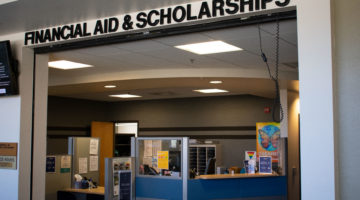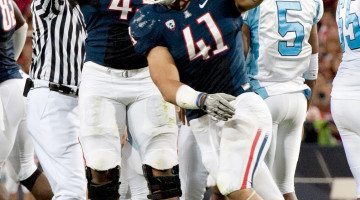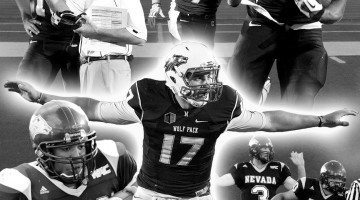By Rocio Hernandez
McQueen High School senior Katalina Rodriguez has always been encouraged by her parents to go to college, but they don’t have enough information to get her there. Rodriguez is a first-generation student and the oldest of six.
Her parents never got the opportunity to advance their education. Her mother did not graduate high school, and her father never earned beyond a GED. Rodriguez, like many other Washoe County students, is left to figure out her path towards college without help from her family.
“I have friends who have older brothers and sisters, and they know how to apply for colleges and scholarship, what to do and I have to bring it all on my own,” Rodriguez said.
The Beyond Government Aid workshops target first-generation students like Rodriguez of all backgrounds and ethnicities that need extra help to find resources to pay for their education. UNR’s Latino Student Advisory Board has held presentations at various high schools in the Reno/Sparks area with the help of Washoe County Diversity and Equity Specialist Fatima Rivas. The workshops started last semester and are free to students and their parents.
“We have been through it and are still going through it for those of us who want a graduate education or an internship,” said LSAB President Ivon Padilla-Rodriguez. “We have been in their shoes, we know how difficult and overwhelming it can be and we have tools that can help [them].”
The workshops focus on financial aid and scholarship information and are divided into two parts. The first is devoted to a broad overview of the types of scholarships that are available and the materials students will need to acquire, such as letters of recommendation and transcripts. Then, they break up into small groups to discuss how to create strong resumes and essays and where to find scholarships.
Rivas says that anyone is welcome to come to the workshops, but they want to keep it focused on first-generation students because they are the ones they feel are most alone in the scholarship process.
“They might hear in school that they might need to apply for scholarships,” Rivas said, “but since they don’t have any firsthand experience or family experience to help them understand [the] process, many of them we have found, even though you say this is where you go to apply to a scholarship, are very hesitant even to go to the website.”
Hug High School senior Hannah Aguirre also benefitted from the help of LSAB. Her dad attended the workshop for her, and she was forwarded to LSAB member Jackeline Duron to meet her one-on-one. She said it was different hearing about scholarships from a current college student, and it made the whole process sound easier and more attainable.
“Teachers just give you a list of scholarships that you can look through and that you’ll be able to apply for,” Aguirre said. “Jackeline asked me who I was and what I was interested in and based off what kind of person I am, she told me what scholarships I could possibly sign up for.”
Latino Research Center director Emma Sepulveda has seen from a professor’s perspective the challenges that some of her students have faced because they are the first college-bound student from their families.
According to Sepulveda, oftentimes, her students were encouraged to go straight into to work after high school in their households. Many of them also lacked a mentor that pushed them academically and gave them moral support.
“All of these things that are difficult for all students, become more of a challenge for first-generation students because they have to walk that road, and they have to convince their own families that college is a good path to follow,” Sepulveda said.
During the workshops, Padilla-Rodriguez and other members have received a lot questions from concerned parents whose students are considering options outside of Reno. They want to know if college changes a student’s morals or personality.
Outreach and Retention Coordinator for the Center for Student Cultural Diversity Saundra Mitrovich believes that it is important to reach to the families of prospective students to dispel some of their concerns.
“It’s not just about recruiting the student, it is about recruiting the family, recruiting the community and I think the best way for us to do that is to have some background on the community,” Mitrovich said.
Rodriguez knows it will be hard, but she is sure that she is going to college no matter what. Her younger siblings motivate her to not give up because she knows that they all look up to her.
“I don’t think I would be trying half as hard if I didn’t have little brothers and sisters pushing me in the right directions,” Rodriguez said. “I’m their role model. My brothers and sisters can see that they can do it as well, because if I can do it, they can do it.”
Rocio Hernandez can be reached at amosher@sagebrush.unr.edu.












